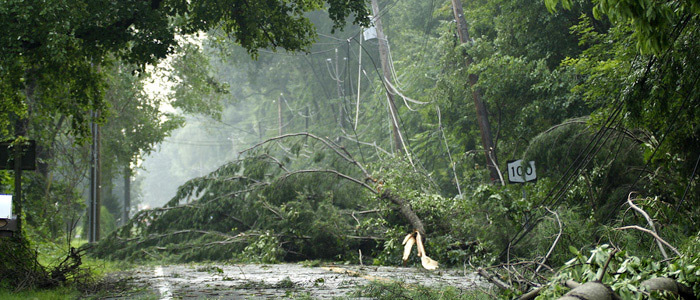Handling Business Closures During Severe Weather

This article was updated on September 19, 2018.
In order to balance employee safety during inclement weather with the need to continue your small business operations, it's a best practice to have inclement weather policies in place. These policies should establish rules regarding whether business locations will be closed during inclement weather, when determinations about closures will be made, how employees will be notified and paid, and other related issues. If and when your area is struck by a dangerous weather pattern, you must provide your employees with clear communication as to if and when your business will close. Otherwise, you risk the safety and engagement of your most important small business assets: your staff members.
Inclement Weather Policies
Your severe weather policy should be in writing and you should communicate it to all of your employees. Whether you're concerned about hurricanes in Florida, snow in Colorado or tornadoes in Nebraska, your policy must inform your employees about how you plan to inform them about closings and how you will manage any related pay issues.
Your policy should consider all contingencies, such as the local electricity being knocked out. In this case, a company-wide email might not reach all of your employees. So it might be better to provide employees with a number they can call for information about whether your business will be open during severe weather or set up a system where your employees are auto-dialed.
You might also want to connect your closures to an external decision maker. For example, you may want to set up a system in which your business will automatically be closed if and when local public schools in your area decide to close. Such a contingency plan would allow your employees to simply monitor widely available school closing listings. The key here is to do what you can to eliminate confusion.
Business Closure and Pay
If you close your business for the entire day and notify all of your employees of the decision before they report to work, under federal rules, you generally do not have to pay your nonexempt employees for that day unless a policy or contract states otherwise. However, salaried employees must be paid their normal, fixed salary whether you decide to close or not.
If you close early, federal rules provide that you generally only need to pay nonexempt employees for the time they actually needed to be at work and any time they spent waiting for a decision to be made regarding closing; you will not have to pay them for the hours when you were closed. Some states have reporting time pay requirements which mandate that employers pay nonexempt, hourly employees a minimum number of hours simply because they showed up at all. As a best practice, you should consult your local employment counsel or HR advisor about any requirements that may apply in your particular state.
Again, salaried employees would receive their regular pay despite your closing early. That said, under federal law, you may require exempt and nonexempt employees to use their accrued time off for work time missed due to inclement weather. However, this could negatively impact employee morale, especially if you charge PTO on days when the office is closed, and some states prohibit this practice. In order to remain compliant, you should check with your employment counsel or HR advisor about this as well.
Depending on the severity of the weather conditions, you may want to consider giving your employees the option to work remotely. In particular, your hourly employees may appreciate this opportunity, as they may not want to lose a day's pay. Once again, communication is key here, as your entire team must understand that the decision to commute on this particular day is completely in their control. Of course, if the weather conditions are particularly severe, you should not offer this option, as employee safety should be your number one concern.
The key to success is crafting a written severe weather policy that clearly describes when you'll close, how you'll communicate this decision to employees and how these decisions will impact pay with respect to nonexempt workers, and also under what conditions they will be charged with PTO. By doing your best to avoid leaving any room for confusion, you can help eliminate some safety risks associated with commuting to work during emergencies.



